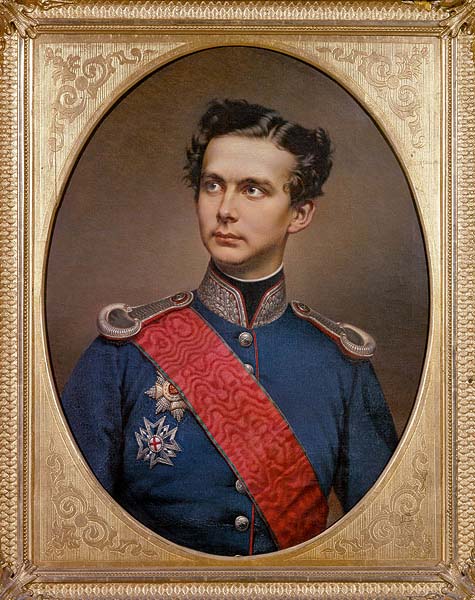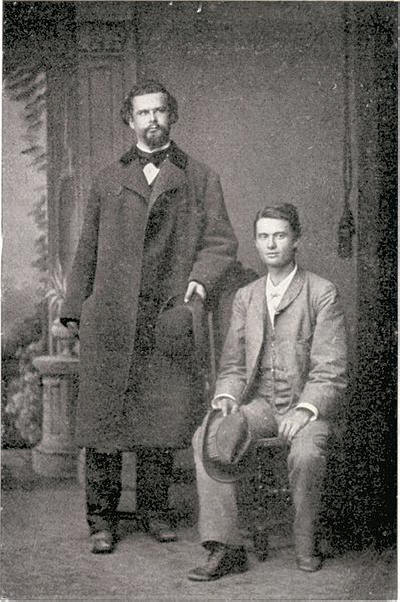

Queer Places:
Munich Residenz, Residenzstraße 1, 80333 München, Germania
Neuschwanstein Castle, Neuschwansteinstraße 20, 87645 Schwangau, Germania
Linderhof Palace, Linderhof 12, 82488 Ettal, Germania
Herrenchiemsee, 83209 Herrenchiemsee, Germania
St Michael, Neuhauser Str. 6, 80333 München, Germania
 Ludwig II (25 August 1845 – 13 June 1886)[1]
was King of Bavaria from 1864 until his death in 1886. He is sometimes
called the Swan King, Mad King Ludwig or der Märchenkönig ("the Fairy
Tale King"). He also held the titles of Count Palatine of the Rhine, Duke of
Bavaria, Duke of Franconia, and Duke in Swabia.[2]
Ludwig II (25 August 1845 – 13 June 1886)[1]
was King of Bavaria from 1864 until his death in 1886. He is sometimes
called the Swan King, Mad King Ludwig or der Märchenkönig ("the Fairy
Tale King"). He also held the titles of Count Palatine of the Rhine, Duke of
Bavaria, Duke of Franconia, and Duke in Swabia.[2]
He succeeded to the throne aged 18. Two years later Bavaria and Austria fought a war against Prussia, which they lost. However, in the Franco-Prussian War of 1870 Bavaria sided with Prussia against France, and after the Prussian victory it became part of the new German Empire led by Prussia. Though Bavaria retained a degree of autonomy on some matters within the new German Reich, Ludwig increasingly withdrew from day-to-day affairs of state in favour of extravagant artistic and architectural projects. He commissioned the construction of two lavish palaces and Neuschwanstein Castle, and he was a devoted patron of the composer Richard Wagner. Ludwig spent all his royal revenues (although not state funds) on these projects, borrowed extensively, and defied all attempts by his ministers to restrain him. This extravagance was used against him to declare him insane, an accusation which has since come under scrutiny.[3] Today, his architectural and artistic legacy includes many of Bavaria's most important tourist attractions.
Ludwig never married, nor had any known mistresses. It is known from his diary (begun in the 1860s), private letters, and other surviving personal documents, that he had strong homosexual desires.[14] He struggled all his life to suppress his sexual desires and remain true to his Roman Catholic faith.[15] While homosexuality had not been punishable in Bavaria since 1813,[16] the Unification of Germany in 1871 under Prussian hegemony changed this.
Throughout his reign, Ludwig had a succession of close friendships with men, including his chief equerry and Master of the Horse, Richard Hornig, Hungarian theater actor Josef Kainz, and courtier Alfons Weber.

Ludwig II and Josef Kainz
Linderhof Palace
Neuschwanstein Castle
.JPG)
Castle Hohenschwangau
Michaelskirche
Ludwig II fell in love with Prince Paul von Thurn und Taxis, with whom he lef off fireworks on the Roseninsel at Berg. We have a photograph of Prince Paul at Lohengrin, in a boat drawn by swans. These moments of bliss were punctuated by quarrels and reconciliations: "my most beloved Angel"; "most precious Ludwig".
Ludwig found a more permanent companion in his good-looking equerry, Richard Hornig, who remained with him some twenty years. Ludwig's diary pathetically records his falls from grace, in his own eyes, and the impossibility of not fulfilling his own nature: "On 6 March 1872, in exactly two months it will be 5 years since that blessed 6th day of May when we first came to know one another, never to part until death. Written in the Indian pavilion. Let it be sworn on our friendship - no further fall before 3 June." In January of that year we find the king vowing "a pure cup of Richard's love and friendship = pure and holy kiss... just one." But by May: "Never again as on 12 May 1872, and otherwise as little as possible." The poor king found it impossible to keep these hard resolutions; after Hornig married - for which Ludwig could not forgive him - his place was taken by a Hungarian actor, Josef Kainz. No one could understand Ludwig's infatuation; apparently Kainz was a different personality when acting a part from the commonplace type he was off the stage.
On 8 June 1886 he was declared insane, and a regent was appointed: on the 12th he was taken to Berg to be shut up. The very next night he and his mental attendant were found drowned in the lake. The king had been quick to end the farce, once he was off the stage. The Empress Elizabeth - whose own son was to come to a not less tragic end with his mistress in the hunting box at Mayerling - had the last kind word for Ludwig: "The King was not mad: he was just an eccentric living in a world of dreams."
Ludwig's original diaries from 1869 onward were lost during World War II, and all that remain today are copies of entries made during the 1886 plot to depose him. Some earlier diaries have survived in the Geheimes Hausarchiv ("secret archives") in Munich, and extracts starting in 1858 were published by Evers in 1986.[17]
My published books: